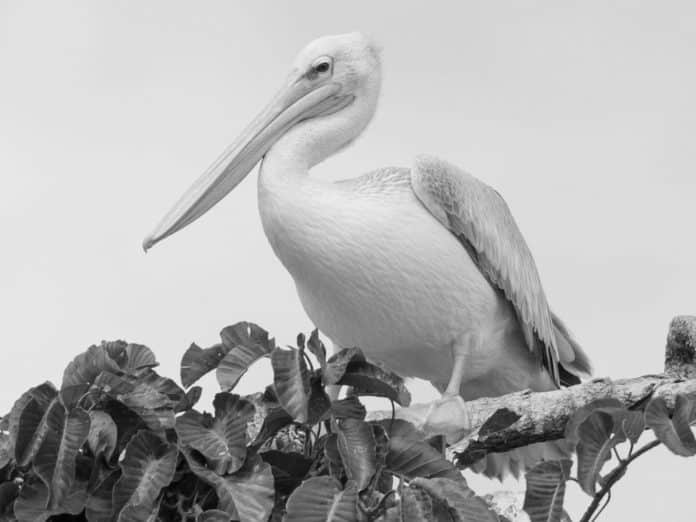Introduction to the Pink-Backed Pelican
Welcome to the enchanting world of the Pink-Backed Pelican, a striking avian species that graces the skies and waters of Tanzania. Known for its distinctive pink plumage and elegant flight, the Pink-Backed Pelican in Tanzania is a sight to behold for bird enthusiasts and nature lovers. This captivating species is native to the African continent, and Tanzania provides a rich and diverse habitat for these graceful birds.

The Pink-Backed Pelican, scientifically referred to as Pelecanus rufescens, belongs to the Pelecanidae family and is recognized for its unique physical characteristics and fascinating behaviors. With its long, broad wings and a characteristic pinkish hue on its back, this pelican species stands out amidst its avian counterparts. As we delve deeper into the world of the Pink-Backed Pelican, you will gain a deeper understanding of its habitat, behavior, conservation status, and the efforts to protect this magnificent species in Tanzania.
Habitat and Distribution of the Pink-Backed Pelican in Tanzania
The Pink-Backed Pelican is widely distributed across sub-Saharan Africa, and Tanzania serves as a significant territory for these majestic birds. Within Tanzania, these pelicans can be found in various habitats, including freshwater lakes, marshes, and coastal areas. The expansive water bodies such as Lake Manyara, Lake Victoria, and the Rufiji River delta provide vital feeding and nesting grounds for the Pink-Backed Pelicans.
These pelicans are highly adaptable and can thrive in both inland and coastal environments, making them a versatile and resilient species. The diverse landscapes of Tanzania offer an array of habitats for the Pink-Backed Pelicans, from the lush wetlands to the serene coastlines, providing ample opportunities for these birds to flourish and sustain their populations.
Behavior and Characteristics of the Pink-Backed Pelican

The Pink-Backed Pelican is characterized by its graceful and synchronized flight, often observed in groups as they soar through the skies in search of food. Their long, slender bills and expandable throat pouches make them proficient fish hunters, and they are often seen diving from the air to catch their prey with remarkable precision. These pelicans are also known for their communal nesting behaviors, often forming large colonies during the breeding season.
In addition to their remarkable hunting and nesting behaviors, the Pink-Backed Pelicans are recognized for their vibrant plumage, with soft shades of pink adorning their backs during the breeding season. This unique coloration sets them apart from other pelican species and adds to their allure as one of the most visually captivating birds in Tanzania.
Conservation Status and Threats Faced by the Pink-Backed Pelican in Tanzania
Despite their adaptability and widespread distribution, the Pink-Backed Pelicans in Tanzania face various conservation challenges and threats to their populations. Habitat loss, pollution of water bodies, and human disturbance near nesting sites are among the primary concerns impacting the well-being of these pelicans.
The International Union for Conservation of Nature (IUCN) has classified the Pink-Backed Pelican as a species of “Least Concern,” indicating that their global population is relatively stable. However, localized threats and the degradation of critical habitats in Tanzania require focused attention and conservation efforts to ensure the long-term survival of these remarkable birds.
Best Places to Spot Pink-Backed Pelicans in Tanzania
If you are eager to witness the beauty of the Pink-Backed Pelicans in their natural habitat, Tanzania offers a range of exceptional locations for birdwatching and wildlife photography. The renowned Lake Manyara National Park is a prime destination for observing these pelicans, where they can be seen gliding gracefully across the lake’s reflective waters and perching on the surrounding trees.
Additionally, the vast expanse of Lake Victoria, Africa’s largest tropical lake, provides an ideal setting for encountering Pink-Backed Pelicans in their element. The Rufiji River delta in the Selous Game Reserve is another notable site where these pelicans congregate, offering an immersive experience amid Tanzania’s diverse and picturesque landscapes.
Tips for Birdwatching and Photographing Pink-Backed Pelicans
For avid birdwatchers and photography enthusiasts, capturing the elegance of the Pink-Backed Pelicans requires a blend of patience, keen observation, and an understanding of their behavior. When embarking on a birdwatching expedition, it is advisable to seek the guidance of experienced local guides who possess intimate knowledge of the best vantage points and the pelicans’ movements.
When photographing Pink-Backed Pelicans, consider the lighting conditions and the surrounding environment to create compelling and evocative images. Whether capturing their in-flight agility or their serene presence along the shoreline, a respectful and unobtrusive approach is essential to minimize disturbance and preserve the natural behaviors of these magnificent birds.
Cultural Significance of Pink-Backed Pelicans in Tanzania

In Tanzanian culture, the Pink-Backed Pelican holds symbolic significance and is often revered for its grace and beauty. In some local folklore and traditions, the pelican is associated with themes of unity, community, and the interconnectedness of nature. Its presence in the country’s diverse ecosystems has inspired stories, art, and cultural expressions that celebrate the natural heritage of Tanzania.
Furthermore, the Pink-Backed Pelican’s role in maintaining the ecological balance of Tanzania’s wetlands and water bodies underscores its cultural importance as a symbol of environmental harmony and biodiversity. As efforts continue to raise awareness about the conservation of these pelicans, their cultural significance serves as a poignant reminder of the intrinsic value of preserving the natural world for future generations.
Conservation Efforts and Organizations Supporting Pink-Backed Pelicans
A concerted commitment to the conservation of Pink-Backed Pelicans in Tanzania is evident through the initiatives of various organizations and wildlife conservation groups. The conservation efforts encompass habitat restoration, community engagement, and scientific research aimed at understanding the ecological dynamics that influence the pelicans’ well-being.
Notable organizations such as the Tanzanian Wildlife Research Institute (TAWIRI) and the Wildlife Conservation Society (WCS) have played instrumental roles in promoting the conservation of Pink-Backed Pelicans and their habitats. Through collaborative partnerships with local communities, governmental bodies, and international conservation agencies, these organizations strive to safeguard the natural landscapes that are vital for the sustenance of these graceful avian residents.
Conclusion
In conclusion, the Pink-Backed Pelican in Tanzania represents a captivating emblem of the country’s rich avian diversity and natural heritage. As we marvel at the elegance of these pelicans and appreciate their ecological significance, it is imperative to recognize the importance of proactive conservation measures to protect their populations and habitats.


































